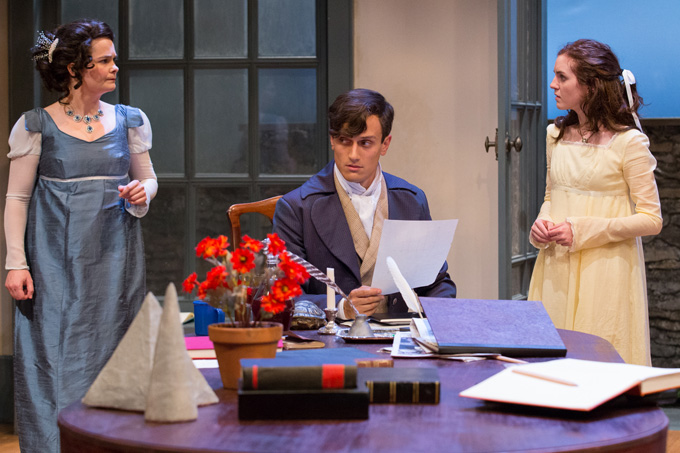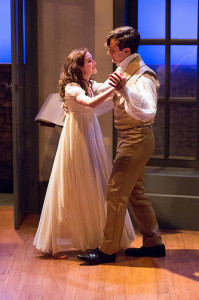Michael Fisher continues his multi-part critical experiment, seeing the Lantern Theater Company’s production of ARCADIA several times over its run. With each viewing, he shares his thoughts not just on the specific performance, but on new revelations it provides with repeat viewing and the evolution of a production over the course of its run. Read his introduction and part one of his experiment.

PART 2.
When I went for my second viewing of Stoppard’s ARCADIA at Lantern Theater Company, my intention was to focus specifically on the performances. I knew the story from having seen it once already, and that knowledge left me free to examine the smaller aspects of the production, undistracted by the anticipation of what was about to happen in the plot.
Not so.
Pure as my intent was, I could not bring myself to divorce the performances from the play, the production from the text. The two were inextricable parts of the same whole, and try as I might, I could not help but get wrapped up in the narrative all over again, even after having seen the same production just five days before.
This is the highest compliment I can pay to Lantern’s actors and technicians.
I wrote in Part 1 of this series about the drag of trying to pin adjectives on a production, and I think this is most troublesome when it comes to actors. To try to boil a live performance by a real, flesh-and-blood human down to a few modifiers is not only difficult but essentially useless. Words like “incendiary” and “transcendent” and “poignant” are all well and good, but in a review they merely function as synonyms for “good.” I wonder if the reason why critics get such a bad rap is because it’s so much easier to go into detail about why something’s bad than about why it’s good. Think of the last meal you had at a restaurant. If you weren’t happy with it, you probably know exactly why: the steak was undercooked, the chicken was too greasy, there was too much pepper on the paprikash. If you were happy with it, however, I doubt you’d be able to elucidate the point. You’d just tell me the meal was great and that I should really try out the restaurant sometime.
It’s the same way with actors. When the performance isn’t working, we’ll tell you why in excruciating detail. When it works, we won’t know what to say. Which is why we fall back on our bed of adjectives and (ugh) adverbs.
And I think I know why this is.

Go back to that meal for a second. Let’s assume you had a fine meal at an affordable price. You got seated right away, received adequate service from the wait staff, and the atmosphere was pleasant without being distracting. You paid the bill and left with a full belly (but not too full), free to continue your evening. Maybe you’ll resolve to post a four- or five-star review on Yelp later on, but otherwise you don’t think about what just happened. You don’t need to. Because it just feels right.
That’s why it’s so difficult to critique good performances. When we’re satisfied that we’ve got our money’s worth, our world feels perfectly in balance. We can do little but be pleased with what just happened and glad we were there to see it.
Still, we have to write something. And so the gods, in a momentary lapse of their otherwise infinite wisdom, invented adjectives and adverbs.
I hate trying to write about good acting performances. Everything I come up with sounds clunky and forced, and that’s usually because it is. Because what I’m really trying to say is something uninteresting yet accurate: This person did exactly what they were supposed to do.
It isn’t helpful, but it’s the truth.
Take Joe Guzman for example. In ARCADIA, he plays Bernard Nightingale, the pompous academic hellbent on proving that Lord Byron committed a murder in 1810 or thereabouts. Guzman is blustery, even swashbuckling as Nightingale—a condescending, pontificating ass with delusions of grandeur. But that doesn’t tell you much of anything about Guzman’s performance, because anyone paying attention to the action can tell that Nightingale is written to be that way. Guzman’s talent, in truth, is to tell his part of Stoppard’s story without stepping on the rest of it. To really understand the value of his performance—the value, in general, of the role of restraint in stage acting—we must examine the very small moments where that restraint does service to the narrative.
There’s a moment, for instance, when Bernard enters and quickly begins sparring with his helper-cum-nemesis Hannah (Kittson O’Neill). He’s convinced he’s found a new piece of quasi-evidence to bend and shape to his liking in his case against Byron. When Hannah insists that further proof is needed, Bernard calls her a “silly bitch.” In the script, there’s an exclamation point there (“You’d have to be there, you silly bitch!”). As we know from Seinfeld, it’s easy to get carried away when it comes to exclamation points. Guzman, however, plays the moment thoughtfully: he’s flustered, but he doesn’t shout (not any more than normal, anyway). Instead, he dismisses Hannah the way we might swat away a persistent fly. He’s firm without being thunderous; he’s incredulous, but he stays just this side of losing his temper.
It’s an infinitesimal moment in a huge play, and yet it’s these little nuances that make up the performance and govern its course. A different actor might have gotten fed up with Hannah right then and there, but that would be wrong, not only because it would neuter Bernard’s redeeming qualities (i.e., he’s an asshole, but his passion is contagious) but because it would throw off the balance of the story’s progression. In the very next scene, Bernard finds himself propositioning Hannah for sex. If he was 100% unlikable, the scene would be impossible to watch without getting squeamish.
It’s because the actors here play these small moments wisely—thoughtfully—that the story is able to remain balanced. We are able to find all of Stoppard’s characters at least a touch likable, and that’s necessary for this very complicated play to land. If Guzman had played up Bernard’s ambition and lasciviousness, it would have taken the piss out of the moments when his charisma and intelligence steer the boat.
The hardest performances to come up with good adjectives for likely belong to Kittson O’Neill (as the aforementioned Hannah) and Daniel Frederick (as a young mathematician named Valentine). Hannah and Valentine are not only the most level-headed characters, but they’re level-headed characters in the present-day timeline of Stoppard’s play (half the play takes place in present day, the other half in the early nineteenth century). This means that not only do they not get to play with any obvious character modifiers (we’ll say “pompous” for Bernard, “ditsy” for his admirer, Chloe, and “shy” for Valentine’s brother, Gus) but they also don’t get the inherited affect of language and manner leant to the characters who are stuck in the past (anyone who’s ever been to the theater can tell you that those coats that are long in the back and short in the front act more loudly than any actor this side of Daniel Day-Lewis). Yet it’s O’Neill and Frederick who carry much of the play, and their performances are important to why it’s successful.
What guides each of the performances is confidence and trust in the script. The very fact that O’Neill and Frederick aren’t “playing” to any adjectives is key. O’Neill walks the stage as if she’s in her own home, carrying herself with the same sort of languid economy we all use when we’re at home making coffee or whatever. She’s typically stoic, lending a bite to her occasional sarcasm and rendering more effective the brief moments when she becomes heated. Hannah’s initial exchange with Bernard has the dry immediacy of a Wilde or a Sorkin, but the light arrives in her eyes when she gets talking about her own work. We know she’s not a dick in the way Bernard is, but we get just a touch of the author’s pride in moments like these.
Frederick, on the other hand, is nothing if not straightforward. His Valentine is fascinated by mathematics, and the work of his postgrad thesis on the population patterns of English grouse consumes him. It was exhausting just to type the words “population patterns of English grouse.” I nearly fell asleep just now. But Stoppard’s play somehow makes the implications of these dogged mathematics play like little symphonies in ARCADIA. Frederick’s contribution is that whenever he’s going on about calculus or algorithms or the second law of thermodynamics, he appears engrossed by the data rather than by his own performance. He understands that, in order for any of this multilayered mindfuckery to make its way to the audience without them defaulting to autopilot, he’s got to really seem as if he not only knows what he’s talking about but cares about it, loves it even. Valentine as a character was written without a great deal of depth to plumb, but his words are the intellectual meat of the play. Frederick speaks with a youthful immediacy through what would otherwise sound like a bunch of staid undergraduate lectures. That it’s even tolerable would be a compliment to Frederick; that it’s no less than captivating means we’ve got something special here.
And now you know why we so rarely tackle acting performances head-on in reviews. It takes thousands of words to conduct a full examination, and we’re still leaving out so many people. And the tragic folly of it all is that, even after all those words, I’m still saying little more than what the actors themselves already know: They’ve done what they were supposed to do. They didn’t behave selfishly, they didn’t step on anyone’s toes, and their work was all in the service of the story. Any good actor knows this as “business as usual.” Yet it remains rare, and so it makes sense to discuss. To pick on specific people for their missteps and miscues would be much easier, but it would also be cruel and would miss the point. Good actors know when they’ve screwed up; bad actors will never know, and it doesn’t help to rub their shortcomings in their faces. There are no bad actors in Lantern’s ARCADIA, but I probably wouldn’t say so even if there were. It wouldn’t do anybody any good. I’d just quietly send back my steak and go eat somewhere else. [Lantern Theater Company at St. Stephen’s Church, 10th and Ludlow streets] September 25-November 9, 2014; lanterntheater.org.
- The introduction to Michael Fisher’s critical experiment
- Part 1 of this multi-part review experiment
- Part 3 of this experiment.
- Read Christopher Munden’s review of the opening night performance of ARCADIA.
- Phindie writer Kathryn Osenlund’s review for CurtainUp.
